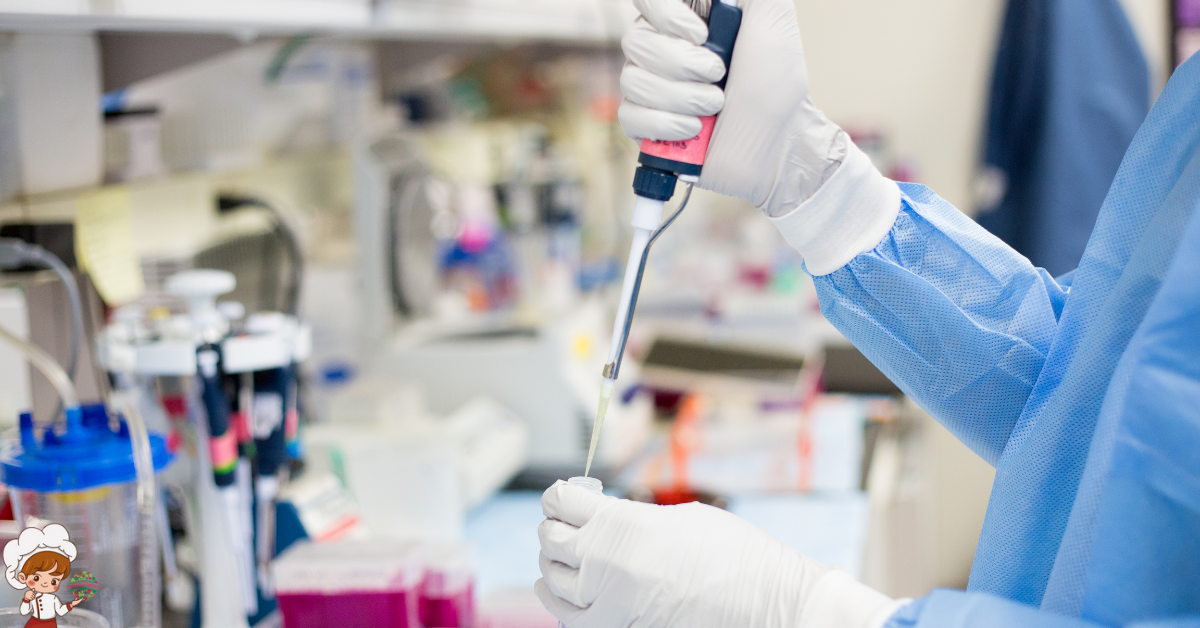The New Food Science and Nutritional Genomics

Food Science and Nutritional Genomics; So you think you know everything there is to know about food? Well, prepare to have your mind blown. Welcome to the captivating world of food science and nutritional genomics, where the secrets of our genes and their interaction with what we eat are slowly being unraveled. But this is not just another fad or health trend; it’s a field that holds immense potential to revolutionize the way we approach nutrition and disease prevention. From understanding the impact of genetics on our dietary choices to exploring the intricate link between our genes and nutrition, this discussion will take you on a journey of discovery, leaving you hungry for more.
The Basics of Nutritional Genomics
Understanding the fundamentals of nutritional genomics is essential for comprehending the intricate relationship between our genes and the impact of food on our health. Nutritional genomics, also known as nutrigenomics, is a field of study that examines how our genes interact with the nutrients in the food we consume. Through understanding gene expression, researchers can gain insights into how different nutrients influence the expression of our genes and ultimately affect our health.
One of the key aspects of nutritional genomics research is understanding gene expression. Gene expression refers to the process by which information from our genes is used to produce functional products, such as proteins. Nutritional genomics aims to investigate how dietary factors can modulate gene expression and subsequently impact our health. By studying gene expression patterns, researchers can identify specific genes that are influenced by different nutrients and understand how these genes contribute to various health outcomes.
Nutritional genomics research methods play a crucial role in unraveling the complex relationship between our genes and the food we eat. These methods typically involve techniques such as microarray analysis and next-generation sequencing to examine gene expression patterns in response to different dietary interventions. Microarray analysis allows researchers to simultaneously measure the expression of thousands of genes, providing a comprehensive view of gene-nutrient interactions. Next-generation sequencing techniques enable the identification of genetic variants that may influence an individual’s response to specific nutrients.
Understanding Food Science and Genetics
To truly understand the relationship between food science and genetics, it is important to recognize the impact that genetics has on our nutrition. Our genes play a significant role in how our bodies metabolize and respond to different nutrients, influencing our dietary needs and health outcomes. Advances in food science have allowed us to better understand these genetic variations and develop personalized nutrition strategies that optimize health and prevent disease. By unraveling the intricate interplay between genetics and food science, we can pave the way for a future of tailored diets and targeted interventions.
Genetic Impact on Nutrition
The genetic makeup of an individual plays a significant role in determining their nutritional needs and responses to certain foods. Genetic factors have been found to contribute to the development of obesity and influence taste preferences. Studies have shown that specific gene variants can increase the risk of obesity by affecting appetite regulation, metabolism, and fat storage. For example, the FTO gene has been associated with a higher risk of obesity and increased food intake.
On the other hand, genetic variations in taste receptor genes can influence an individual’s preference for certain flavors, such as sweetness or bitterness. Understanding these genetic influences on nutrition can help in personalized dietary recommendations and interventions, leading to better health outcomes for individuals. Further research in this field will continue to unravel the complex relationship between genetics and nutrition.
Food Science Advancements
Advancements in food science have allowed researchers to gain a deeper understanding of the intricate relationship between genetics and nutrition. These innovations in food science have had a significant impact on our understanding of how food processing affects our genes and overall health. Here are four key developments in food science that have contributed to this understanding:
- Nutrigenomics: This field combines nutrition and genomics to study how different nutrients interact with our genes and how this interaction affects our health.
- Functional Foods: These are foods that have been fortified or modified to provide specific health benefits beyond basic nutrition. Functional foods are designed to target specific genetic variations or health conditions.
- Metabolomics: This branch of food science focuses on studying the small molecules and metabolites in our body that are influenced by our diet. By examining these metabolites, researchers can gain insights into the impact of food processing on our genes and metabolism.
- Food Processing Techniques: Advances in food processing techniques have allowed for the preservation and enhancement of nutritional content in foods. These techniques include methods such as freeze-drying, pasteurization, and fermentation.
Through these food science innovations, researchers are gaining a deeper understanding of how our genes and nutrition interact, leading to improved dietary recommendations and personalized nutrition plans.
The Impact of Genetics on Dietary Choices
Genetics plays a significant role in shaping an individual’s dietary choices and preferences. Our taste preferences, for example, are influenced by our genetic makeup. Certain genetic variations can make us more or less sensitive to certain tastes, such as bitterness, sweetness, or savory flavors. This can impact our food choices, as our genetics predispose us to prefer or avoid certain tastes. For instance, some people have a genetic predisposition to taste bitterness more intensely, which may make them less likely to enjoy bitter foods like dark leafy greens or certain types of coffee. On the other hand, individuals with a genetic variation that makes them less sensitive to bitterness may find these foods more palatable.
Genetics also plays a role in food allergies. Certain genetic variations can increase an individual’s risk of developing allergies to specific foods. For example, variations in genes related to the immune system can influence the likelihood of developing allergies to common allergens like peanuts, shellfish, or gluten. Understanding these genetic predispositions can help individuals make more informed dietary choices and prevent allergic reactions.
Exploring the Human Genome and Nutrition
Exploring the intricate relationship between the human genome and nutrition yields valuable insights into the role of genetic factors in shaping dietary needs and health outcomes. Understanding how our genes interact with the food we consume can help us develop personalized nutrition plans that optimize our health and well-being. Here are four key points to consider when exploring gene-diet interactions and personalized nutrition:
- Genetic Variations: Each individual has a unique genetic makeup that influences how their body processes and responds to different nutrients. Genetic variations can affect our ability to metabolize certain substances, such as lactose or caffeine, and may also impact our risk of developing certain health conditions, such as diabetes or cardiovascular disease.
- Nutrient Requirements: Genetic factors play a significant role in determining our individual nutrient requirements. For example, some people may have a higher need for certain vitamins or minerals due to genetic variations that affect their absorption or utilization. By understanding these genetic factors, we can tailor our diets to meet our specific needs and optimize our nutritional intake.
- Disease Risk: Certain genetic variations can increase our susceptibility to certain diseases or conditions. By identifying these genetic markers, we can better understand our individual risk profiles and make informed dietary choices to mitigate those risks. For example, individuals with a genetic predisposition to obesity may benefit from personalized dietary strategies that focus on weight management.
- Precision Nutrition: The field of nutritional genomics aims to develop personalized nutrition approaches based on an individual’s genetic profile. By analyzing an individual’s genetic data, researchers and healthcare professionals can provide personalized dietary recommendations that take into account their unique genetic makeup. This approach has the potential to improve the effectiveness of nutrition interventions and help individuals achieve optimal health outcomes.
Unraveling the Link Between Diet and Gene Expression
To understand the link between diet and gene expression, it is important to explore the mechanisms of diet-gene interaction. Nutrigenomics research has provided valuable insights into how specific nutrients and dietary patterns can influence gene expression. These findings have significant implications for personalized nutrition, as they highlight the potential of tailoring dietary recommendations based on an individual’s unique genetic makeup.
Diet-Gene Interaction Mechanisms
Understanding the intricate mechanisms of diet-gene interaction allows researchers to unravel the complex link between dietary choices and gene expression. Epigenetic modifications and gene nutrient interactions play crucial roles in this process. Here are four key mechanisms that contribute to diet-gene interactions:
- DNA methylation: Diet can influence the addition or removal of methyl groups on DNA, altering gene expression patterns.
- Histone modification: Certain nutrients can modify histone proteins, which help regulate gene activity by affecting the accessibility of DNA.
- Non-coding RNA: Dietary factors can impact the production and function of non-coding RNA molecules, which can bind to genes and regulate their expression.
- Transcription factor activation: Nutrients can activate or inhibit transcription factors, proteins that bind to DNA and control the rate of gene transcription.
Nutrigenomics Research Findings
Nutrigenomics research findings have provided valuable insights into the intricate relationship between diet and gene expression. This emerging field of study focuses on how the food we consume can impact our genes and, consequently, our health and performance. One area of interest is the relationship between nutrigenomics and gut health. Studies have shown that certain dietary components can influence the composition of gut microbiota, which plays a crucial role in maintaining a healthy gut. By understanding how specific nutrients interact with our genes, researchers can develop personalized dietary interventions to improve gut health and prevent various gastrointestinal disorders.
Another area of exploration is the link between nutrigenomics and sports performance. It is well-known that nutrition plays a crucial role in optimizing athletic performance, but recent research has delved deeper into the genetic factors that contribute to individual responses to specific dietary interventions. By analyzing an athlete’s genetic profile, researchers can identify specific gene variants that may influence nutrient metabolism, muscle recovery, and energy production. With this knowledge, personalized nutrition plans can be developed to maximize an athlete’s performance and recovery, leading to improved training outcomes and competitive success.
Impact on Personalized Nutrition
Unraveling the link between diet and gene expression allows for the development of personalized nutrition plans based on individual genetic profiles, optimizing health and performance. Here are four ways in which understanding this link can impact personalized nutrition:
- Personalized meal plans: By analyzing an individual’s genetic makeup, it is possible to identify specific dietary requirements and tailor a meal plan that meets their unique needs. This can include recommendations for macronutrient ratios, micronutrient intake, and even specific foods to avoid or include.
- Genetic testing for nutrition: Genetic testing can provide valuable information about an individual’s genetic predispositions and how they may interact with different foods. This information can be used to inform dietary choices and create personalized nutrition plans that are more effective in achieving desired health outcomes.
- Optimal nutrient absorption: Understanding the genetic factors that influence nutrient absorption can help identify individuals who may have specific nutrient deficiencies or difficulties in metabolizing certain nutrients. This knowledge can be used to design personalized nutrition plans that focus on optimizing nutrient absorption and utilization.
- Prevention and management of chronic diseases: Certain genetic variations can increase the risk of developing chronic diseases such as diabetes, cardiovascular diseases, and obesity. With personalized nutrition plans, individuals can be guided towards dietary choices that can mitigate these risks and support their overall health and well-being.
Nutrigenomics: Personalized Nutrition for Optimal Health
By exploring the field of nutrigenomics, you can gain personalized insights into your nutritional needs for optimal health. Nutrigenomics is the study of how individual genetic variations interact with nutrients in food, and how these interactions influence our health. It aims to provide tailored dietary recommendations based on an individual’s genetic makeup, allowing for personalized nutrition plans.
Optimal health is achieved when our bodies receive the right balance of nutrients to support their functions. Nutrigenomics recognizes that each person’s genetic makeup is unique, and therefore their nutritional needs may also differ. By analyzing an individual’s genetic information, scientists can identify specific genetic variations that may impact how the body processes and utilizes certain nutrients.
For example, certain individuals may have genetic variations that affect their ability to metabolize carbohydrates efficiently. This information allows for personalized recommendations, such as reducing carbohydrate intake or selecting carbohydrates with a lower glycemic index, to help maintain stable blood sugar levels and prevent conditions like diabetes.
Furthermore, nutrigenomics can provide insights into how an individual’s genetic variations may affect their response to certain dietary components, such as fats or antioxidants. This knowledge can guide personalized dietary interventions to optimize health outcomes.
It is important to note that while nutrigenomics offers valuable insights into personalized nutrition, it is not the sole determinant of optimal health. Other factors, such as lifestyle, environmental influences, and overall dietary patterns, also play significant roles.
Epigenetics: How Food Can Change Our Genes
Did you know that what you eat can actually change the way your genes are expressed? This fascinating field of research, known as nutritional epigenetics, explores how the food we consume can influence our genetic code. Through the modification of gene expression, certain nutrients and compounds found in our diet can potentially impact our health and susceptibility to diseases. Understanding the intricate relationship between gene expression and diet is crucial for developing personalized nutritional strategies for optimal health.
Gene Expression and Diet
Understanding the intricate relationship between gene expression and diet is crucial in unraveling the fascinating field of epigenetics and how our food choices have the potential to impact our genes. Gene expression regulation refers to the process by which genes are activated or deactivated, determining the production of specific proteins in our bodies. Dietary gene interactions play a significant role in this regulation. Here are four key points to consider:
- Nutrients in our diet can directly influence gene expression by binding to specific receptors and activating or inhibiting gene transcription.
- Epigenetic modifications, such as DNA methylation and histone modifications, can be influenced by our dietary choices, leading to changes in gene expression patterns.
- Certain bioactive compounds found in foods, like polyphenols and omega-3 fatty acids, have been shown to have the ability to modulate gene expression and exert beneficial effects on health.
- Different dietary patterns, such as the Mediterranean diet or the DASH diet, have been associated with specific gene expression profiles, highlighting the impact of dietary choices on gene regulation.
Nutritional Epigenetics
Nutritional epigenetics explores how our dietary choices can induce changes in our genes, ultimately impacting our health and well-being. Epigenetic modifications refer to alterations in gene expression that are not caused by changes in the DNA sequence itself, but rather by chemical modifications of the DNA or its associated proteins. These modifications can be influenced by various factors, including our diet. Research has shown that certain nutrients, such as folate, vitamin B12, and polyphenols, can affect epigenetic processes by altering DNA methylation and histone modifications.
Additionally, gene environment interactions play a crucial role in nutritional epigenetics. The interaction between our genes and the environment, including our diet, can determine how our genes are expressed and can have long-lasting effects on our health. Understanding the complex relationship between nutrition, epigenetic modifications, and gene environment interactions is vital for developing personalized dietary strategies to optimize health and prevent chronic diseases.
Genetic Variations and Nutrient Metabolism
Genetic variations play a crucial role in the metabolism of nutrients. These variations can influence an individual’s dietary response and their ability to process and utilize different nutrients. Understanding the relationship between genetic makeup and personalized nutrition is a key area of research in the field of nutritional genomics. Here are four important points to consider:
- Genetic variations and dietary response: Genetic variations can affect how our bodies respond to specific nutrients. For example, certain genetic variations can impact the metabolism of carbohydrates, fats, or proteins. This means that individuals may have different dietary requirements based on their genetic makeup.
- Personalized nutrition: The field of nutritional genomics aims to develop personalized nutrition recommendations based on an individual’s genetic profile. By identifying specific genetic variations, scientists can provide personalized dietary recommendations that take into account an individual’s unique genetic makeup.
- Genetic makeup and nutrient metabolism: Genetic variations can influence how our bodies metabolize and utilize nutrients. For example, some individuals may have genetic variations that affect their ability to absorb certain vitamins or minerals. Understanding these genetic variations can help develop targeted interventions to optimize nutrient metabolism.
- Implications for health and disease: Genetic variations in nutrient metabolism can have implications for an individual’s health and disease risk. For example, certain genetic variations may increase the risk of developing conditions like obesity, diabetes, or cardiovascular disease. By understanding an individual’s genetic makeup, healthcare professionals can provide personalized dietary recommendations to mitigate these risks.
Nutrigenetics: Unlocking the Secrets of Individualized Diets
Building upon the knowledge of genetic variations and nutrient metabolism, researchers are now exploring the fascinating field of nutrigenetics to uncover the secrets of individualized diets. Nutrigenetics is the study of how genetic variations influence an individual’s response to specific nutrients and dietary components. This emerging field aims to provide personalized dietary recommendations based on an individual’s unique genetic makeup.
Epigenetic modifications play a crucial role in nutrigenetics. Epigenetics refers to changes in gene expression that are not caused by alterations in the DNA sequence itself but rather by modifications to the DNA or the proteins associated with it. These modifications can be influenced by environmental factors, including diet. By studying epigenetic modifications, researchers can gain insights into how certain nutrients affect gene expression and how individual genetic variations can influence these effects.
The goal of nutrigenetics is to develop personalized diets that optimize health and prevent disease. By understanding an individual’s genetic variations and how they interact with specific nutrients, researchers can tailor dietary recommendations to meet their unique needs. For example, individuals with certain genetic variations may require higher or lower levels of specific nutrients to achieve optimal health outcomes.
Personalized diets based on nutrigenetic principles can have a significant impact on an individual’s health. They can help prevent or manage chronic diseases, such as obesity, diabetes, and cardiovascular diseases. Moreover, they can optimize nutrient absorption and metabolism, leading to improved overall well-being.
The Role of Food in Preventing Chronic Diseases
Food plays a crucial role in preventing chronic diseases by providing essential nutrients and bioactive compounds that support overall health and well-being. The relationship between preventing chronic diseases through diet and genetics is a complex and multifaceted one. Researchers have identified several ways in which food can help prevent chronic diseases:
- Nutrient balance: Consuming a balanced diet that includes a variety of nutrient-rich foods can help prevent chronic diseases. Nutrients like vitamins, minerals, and antioxidants play key roles in supporting the body’s immune system, reducing inflammation, and protecting against cellular damage.
- Phytochemicals: Many plant-based foods contain bioactive compounds called phytochemicals, which have been shown to have various health benefits. For example, the phytochemicals found in fruits and vegetables have been linked to a reduced risk of heart disease, certain cancers, and other chronic conditions.
- Fiber: A diet high in fiber has been associated with a lower risk of developing chronic diseases such as type 2 diabetes, heart disease, and certain types of cancer. Fiber-rich foods, such as whole grains, legumes, fruits, and vegetables, help regulate blood sugar levels, promote healthy digestion, and maintain a healthy weight.
- Omega-3 fatty acids: Foods rich in omega-3 fatty acids, such as fatty fish, walnuts, and flaxseeds, have been shown to have anti-inflammatory effects and may help reduce the risk of chronic diseases, including heart disease, stroke, and certain types of cancer.
Gene-Diet Interactions and Disease Risk
To further explore the connection between diet and chronic diseases, it is important to investigate the intricate interplay between genetic factors and dietary choices in determining disease risk. Gene-diet interactions refer to the complex relationship between our genes and the food we consume, and how this interaction can influence our susceptibility to diseases. The field of nutritional genomics aims to understand how specific genes are influenced by different nutrients and how this knowledge can be used to develop personalized nutrition recommendations.
Recent research has shown that gene-diet interactions play a significant role in determining an individual’s risk of developing chronic diseases such as obesity, diabetes, and cardiovascular disease. For example, certain genetic variations can affect how our bodies metabolize certain nutrients, such as carbohydrates or fats. This means that individuals with specific genetic variations may have different dietary requirements to optimize their health outcomes.
Personalized nutrition takes into account an individual’s unique genetic makeup and tailors dietary recommendations accordingly. By identifying genetic variants that influence nutrient metabolism or disease risk, personalized nutrition can provide targeted dietary advice to optimize health outcomes and prevent disease.
Advancements in technology, such as DNA sequencing and bioinformatics, have made it easier to identify genetic variants associated with specific dietary responses. This knowledge can be used to develop interventions that are tailored to an individual’s genetic profile, leading to more effective and personalized approaches to disease prevention and management.
Future Implications and Exciting Developments in Nutritional Genomics
Exciting developments in nutritional genomics are shaping the future of personalized nutrition and disease prevention. As research advancements continue to uncover the intricate relationship between genes and diet, new possibilities for improving health outcomes through targeted interventions are emerging. Here are four future applications and research advancements in nutritional genomics that hold great promise:
- Precision nutrition: Nutritional genomics has the potential to revolutionize the field of nutrition by creating personalized dietary recommendations based on an individual’s genetic makeup. By analyzing an individual’s genetic profile, researchers can identify specific gene-diet interactions that may influence nutrient metabolism and disease risk. This personalized approach to nutrition can optimize health outcomes and prevent the development of chronic diseases.
- Disease prevention and management: Nutritional genomics research is increasingly focused on identifying genetic markers associated with increased disease susceptibility. By understanding the genetic factors that influence disease risk, researchers can develop targeted interventions to prevent or manage these conditions. For example, individuals with specific genetic variations may benefit from tailored dietary interventions to reduce their risk of cardiovascular disease or type 2 diabetes.
- Nutrigenomics in sports performance: Nutritional genomics can also be applied to sports performance by identifying genetic variations that affect nutrient metabolism, muscle recovery, and exercise response. This knowledge can help athletes optimize their diets to enhance performance and recovery, leading to better training outcomes and improved athletic performance.
- Personalized dietary supplements: As our understanding of genetic variations and nutrient metabolism increases, personalized dietary supplements can be developed to address specific nutrient deficiencies or requirements. By tailoring supplement formulations to an individual’s genetic profile, we can ensure optimal nutrient absorption and utilization, enabling better overall health and well-being.
Food Science and Nutritional Genomics; Frequently Asked Questions
Can Nutritional Genomics Be Used to Treat Chronic Diseases?
Yes, nutritional genomics can be used to treat chronic diseases. By using nutritional genomics for personalized medicine, we can understand the role of epigenetics in chronic disease treatment and develop targeted interventions.
How Does Food Affect Gene Expression?
Food can affect gene expression through epigenetic modifications. Nutrigenomics research has shown that certain nutrients in your diet can influence the activity of your genes, potentially impacting your health and disease risk.
What Are the Potential Future Developments in Nutritional Genomics?
In the future, personalized nutrition will likely be a key development in nutritional genomics. This field has the potential to revolutionize how we approach food and its impact on gene expression.
Is There a Specific Diet That Can Be Recommended for Individuals Based on Their Genetic Makeup?
Based on your genetic makeup, personalized nutrition can be recommended through genetic testing. By analyzing your genes, specific dietary recommendations can be tailored to optimize your health and well-being.
Can Genetic Variations Impact Nutrient Metabolism and Absorption?
Genetic variations can indeed impact nutrient metabolism and absorption. These variations can affect how your body processes and utilizes nutrients. Additionally, the gut microbiome, which is influenced by genetics, plays a role in nutrient absorption.
Conclusion
In conclusion, the field of nutritional genomics, also known as nutrigenomics, offers a promising avenue for understanding the intricate relationship between our genes and dietary choices. Through studying the impact of genetics on food science, we can unravel the link between diet and gene expression, leading to the development of individualized diets based on an individual’s unique genetic makeup. This knowledge has the potential to revolutionize preventive medicine, as it enables us to identify gene-diet interactions that influence disease risk. Exciting developments in this field hold great promise for the future of personalized nutrition.








